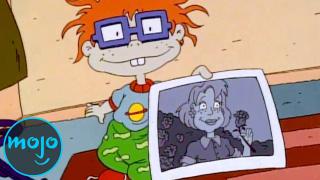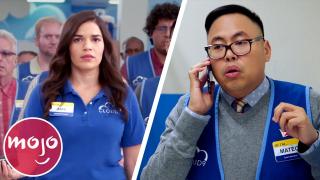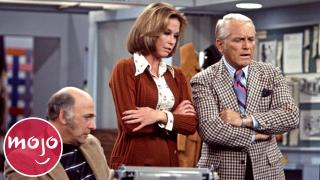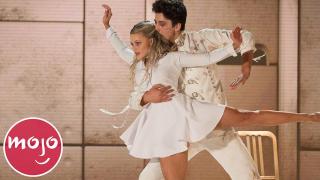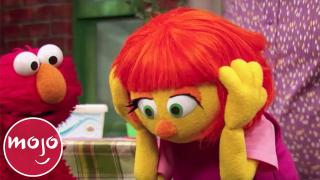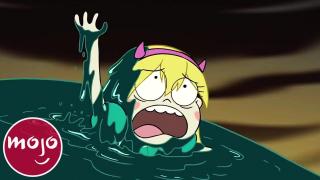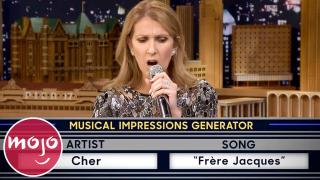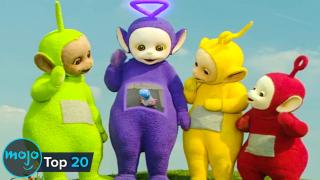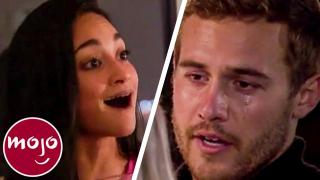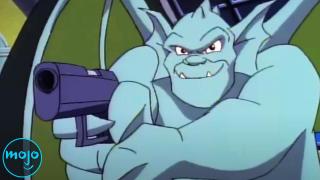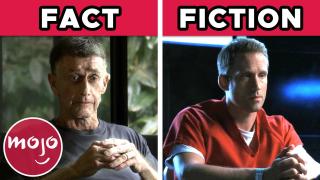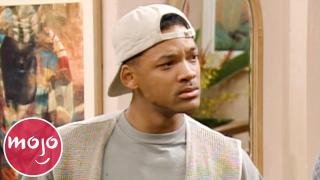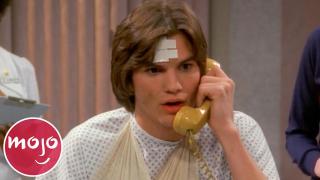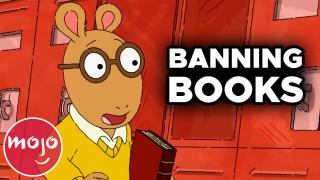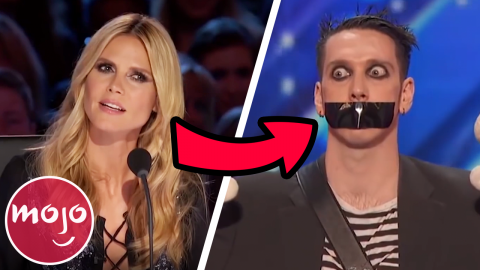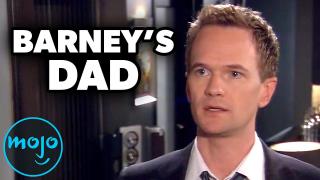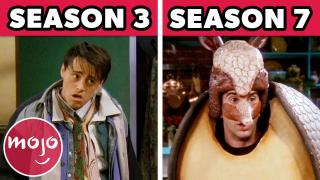Top 20 Kids Show Episodes That Dealt With Serious Issues
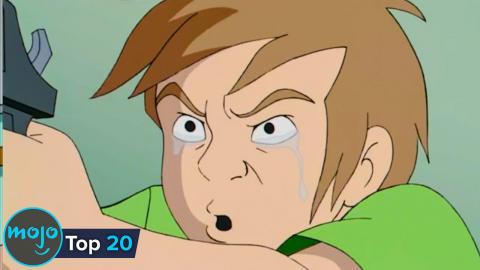
#20: “Inner Beauty”
Top 10 Kids Show Episodes That Dealt With Serious Issues
“Lizzie McGuire” (2001-04) We remember “Lizzie McGuire” for the wacky hijinks, but this surprisingly grounded episode sticks with fans above all others. When Miranda sees a photo of herself, she’s driven to lose weight. Lizzie and Gordo are beyond confused, and they only grow more concerned as Miranda starts skipping meals and nearly passes out. Miranda does have an eating disorder, but not in the way that she thinks. Her dangerous diet is rooted in stress and the pursuit of control. While Miranda’s dilemma is resolved in half-hour sitcom fashion, the episode gets to the center of anorexia and the need for an understanding support system. To an extent, it mirrored life behind the scenes, as Hilary Duff also struggled with body image as a teen.
#19: “And She Was Gone”
Top 10 Times Superstore Tackled Serious Issues
“As Told by Ginger” (2000-06) While she was in the 7th grade, Emily Kapnek wrote a play about a girl who takes her own life. Kapnek was subsequently required to visit the school psychologist’s office on a daily basis. Although most of her teachers were concerned, the drama teacher, Ms. Zorski, found the play creative, putting it on as a production. Years later, the experience inspired an episode of this Nicktoon, in which a character named after Ms. Zorski reads an alarming poem by Ginger. Ginger doesn’t want to disappear like the girl in her poem. Upon opening up to others, though, Ginger finds that there is a little of herself in the character. Writing provides an outlet for Ginger to understand depression and how it affects us all.
#18: “I Remember You”
Top 10 Times The Mary Tyler Moore Show Tackled Serious Issues
“Adventure Time” (2010-18) “Adventure Time” constantly crept up on us with its layered character development. At the beginning of the series, most folks write off the Ice King as bonkers. As we delve deeper into his backstory, we find that Ice King is not only a tragic figure, but he reflects real people living with Alzheimer’s and bipolar disorder. Nowhere is this better exemplified than in his jam session with Marceline. The Vampire Queen finds it hard to be around the Ice King, knowing that the father figure she once knew has lost his memories and grip on reality. Through the power of music, Ice King and Marceline find a way to reconnect. Ice King might not remember everything, but the love is still there.
#17: “Dances with Ignorance”
Top 10 Best Contemporary Dances on Dancing with the Stars
“Pepper Ann” (1997-2000) “Pepper Ann” doesn’t get as much attention as some other Disney shows, but it was ahead of the curve on many issues. Nowadays, it’s not uncommon for kids’ shows to tackle offensive stereotypes. In the late-90s, though, it was a bold subject for One Saturday Morning. Discovering that she’s 1/16th Navajo, Pepper Ann wishes to embrace her heritage. Alas, her knowledge is limited to grossly inaccurate depictions in movies and games, not to mention that crying Native American ad. There are even a few jabs at Disney’s “Pocahontas.” Although this could’ve backfired, the episode makes it clear that Pepper Ann is the ignorant one, which she learns upon offending a Navajo family. Pepper Ann commits to learning more about her background by listening.
#16: “Hey, Who Wants Pizza?”
Top 10 Times Sesame Street Tackled Serious Issues
“Andi Mack” (2017-19) “Andi Mack” was revolutionary for several reasons, most notably marking the first Disney Channel show to include a gay character among the main cast. Granted, shows like “Good Luck Charlie” featured LGBTQ+ characters, but the network had never shined the spotlight on a young person coming out. Cyrus Goodman’s story arc reaches a pivotal point in the Season 2 premiere as he confesses to Buffy that he likes Jonah. Cyrus’ journey continued to evolve throughout the series, culminating with him telling Jonah that he’s gay - another first for Disney Channel. Creator Terri Minsky based Cyrus on some of her daughter’s friends, who realized they were gay in middle school. Through Cyrus, more LGBTQ+ kids can grow up knowing that they’re not different.
#15: “Why, Charlie Brown, Why?” (1990)
Top 10 Darkest Disney Channel Episodes
“Peanuts” was always more adult than some gave it credit with life’s disappointing curveballs being a common theme. This Emmy-nominated special found the series at its most mature, delving into an issue no child should have to face. Alas, too many have no choice. Charles Schulz was no stranger to cancer, having lost his mother to the disease. It was a Stanford Children’s Hospital nurse, Sylvia Cook, who encouraged Schulz to produce a project featuring young cancer patients. With input from the American Cancer Society, Schulz wrote a special revolving around Janice, a young girl with leukemia. Although it doesn’t shy away from the cruel nature of cancer, the special is ultimately life-affirming. Janice proves resilient throughout treatment, finishing chemotherapy with hopeful results.
#14: “Jimmy”
Top 10 Wheel of Musical Impressions on Jimmy Fallon
“Static Shock” (2000-04) This underappreciated DCAU won a Humanitas Prize for its Season 2 finale, which is just as relevant now as when it first aired in 2002. Released only three years after the Columbine tragedy, the episode revolves around Jimmy Osgood, a young man who’s been mistreated at school. Coming across Jimmy’s computer, Virgil realizes that he’s taken his father’s gun. Virgil deals with traditional comic book villains on a regular basis. Yet, few images in the series are more haunting than a scared, angry teen pointing a gun at his tormenter, accidentally shooting Richie amid the chaos. Although thankfully nobody dies, Jimmy’s actions have consequences. Not everyone learns a lesson, but Virgil will always be on the lookout to prevent something like this from happening again.
#13: “Mad Love”
Top 20 Kids Show Concepts That Are Actually Horrifying
“The New Batman Adventures” (1997-99) “Batman” paved the way for shows such as “Static Shock.” With episodes like “It’s Never Too Late” tackling drug use and redemption, the series felt as if it could take place in the real world. This even extended to over-the-top villains like The Joker and Harley Quinn. The older we get, the more eerily identifiable their toxic relationship becomes. Harley’s devotion to Mr. J was fleshed out in the Eisner Award-winning comic “Mad Love,” which would be faithfully adapted to the screen. The story captures how a promising individual can have their world turned upside down by a manipulative love interest. Even when someone finally says enough is enough, an empty gesture may be all it takes for the vicious cycle to repeat.
#12: “Appa’s Lost Days”
“Avatar: The Last Airbender” (2005-08) Taking place against the backdrop of war, we could include the entirety of “Avatar: The Last Airbender” on this list. Since individual episodes are the focus here, however, we’re singling out one of the show’s saddest half-hours. Separated from Team Avatar, flying bison Appa is sold to a circus after being abducted. Appa winds up at the mercy of a sadistic animal tamer while much of the audience finds amusement in his suffering. “Appa’s Lost Days” won a Genesis Award from the Humane Society for its depiction of how circuses have treated countless animals, a topic that’s only gotten more attention since the initial airing. Even after Appa escapes, the lost animal endures a physically and emotionally exhausting journey while searching for Aang.
#11: “Faces of Hope: The Kids of Afghanistan”
The Bachelor Week 4 Recap: Victoria Faces Ex Chase Rice & Alayah Returns! I The Bach Chat 🌹
“Nick News” (1992-) “Nick News” regularly approached real-world issues in a way that young audiences could understand without talking down to them. In the early 2000s, virtually every news program was reporting on the Taliban. However, only a select few focused on how the Taliban affects the children in Afghanistan. In this Emmy-winning special, Linda Ellerbee provided a platform for several Afghan kids who left their home county after the Taliban rose to power. The episode explores why the Taliban and Osama bin Laden have solidified themselves as enemies of the U.S. At the same time, we see how the Taliban has made life unbearable for innocent people in Afghanistan. The special also emphasizes that many Muslims condemn the Taliban and just want to live in peace.
#10: “Alone at Sea”
Top 10 WTF Kids Show Moments
“Steven Universe” (2013-19) Behind its colorful, bubbly exterior, “Steven Universe” has gotten some pretty mature messages across to its audience. One of the most unsettling episodes finds Steven trying to comfort Lapis Lazuli shortly after she escapes Jasper’s clutches. Although their relationship was a recipe for disaster, Lapis reveals that she actually misses Jasper and feels that they belong together. When Jasper tracks Lapis down and asks her to fuse into Malachite, she’s tempted to repeat a toxic cycle, but rejects it with Steven's support. Through Lapis, the writers deliver a down-to-earth look at the nature of abusive relationships, as well as the effects of post-traumatic stress disorder.
#9: “True Colors”
Top 10 CSI Episodes That Mirror True Events
“That’s So Raven” (2003-07) This episode of “That's So Raven” explored Black History Month, but also delved into racial prejudices that still very much exist in 21st-century America. Raven applies for a job for which she is clearly the most qualified, only to see the Caucasian Chelsea land the position instead. Through a vision, Raven learns that the manager made her decision solely based on skin color. Raven additionally finds that she’s far from the first person of color who has faced job discrimination. Above all else, she learns that one person can make a huge difference in the fight for inclusion.
#8: “Mel vs. the Future”
Top 20 Times The Fresh Prince of Bel-Air Tackled Serious Issues
“Gortimer Gibbon’s Life on Normal Street” (2014-16) Overcome with denial, Mel refuses to cry over the sudden loss of her mother, and instead dedicates all of her energy towards building a time machine. Mel eventually crosses paths with her future self, who reveals that even after mastering time travel, she was still unable to save their mother. Regardless, Mel is willing to spend the rest of her life trying to undo this unspeakable tragedy. It isn’t until Mel finally confides in her family and friends that she accepts her mother’s passing. Even in the fantastical world of Normal Street, there are some harsh realities we can never escape.
#7: “Helga on the Couch”
“Hey Arnold!” (1996-2004) Why exactly is Helga so aggressive? Well, this episode reveals her father is likely a narcissist, her mother is probably an alcoholic, and she’s always lived in her overachieving sister’s shadow. After punching a student, Helga is forced to meet with a child psychiatrist. Though reluctant, Helga soon places her trust in Dr. Bliss. We know Helga is troubled, but this episode really delved into her insecurities and emotional scars. It additionally showed us why she’s so afraid to share her true feelings for Arnold. Dr. Bliss ultimately teaches Helga that she isn’t alone, a message neglected children everywhere can take to heart.
#6: “A Formula for Hate”
Top 10 Best That '70s Show Episodes
“Captain Planet and the Planeteers” (1990-96) Taking a break from protecting the environment, “Captain Planet” tackled the HIV/AIDS crisis. We meet Todd Andrews, a young HIV-positive athlete voiced by Neil Patrick Harris. As rumors about the disease spread, Todd and his mother, voiced by Elizabeth Taylor, become outcasts in the community. The episode does, admittedly, simplify the hardships HIV/AIDS patients face, but it was still incredibly risky for a children’s animated series to take on this difficult subject matter, especially in the ‘90s. What the showrunners deliver is a well-meaning life lesson that both educates on AIDS and encourages acceptance.
#5: “The Great MacGrady”
Top 10 Times When Arthur Tackled Serious Issues
“Arthur” (1996-2022) Mrs. MacGrady has been appearing on this series since season one. So it came as a massive blow to viewers when she was diagnosed with cancer. The way Arthur and his friends react to this news feels surprisingly relatable and authentic. Arthur and D.W. try to comfort MacGrady, Muffy doesn’t entirely understand what she’s going through, and Francine is too afraid to visit her in person. Fortunately, Francine works up the courage following a talk with Lance Armstrong. This episode was co-written by Leah Ryan, who passed away from cancer before its airing. In her honor, MacGrady was later gifted the first name “Leah”.
#4: “America's Kids Respond”
Top 10 Most Surprising America's Got Talent Auditions
“Zoom” (1999-2005) The terrorist attack of September 11, 2001 has inspired many stories throughout the years, and “Zoom” was one of the first programs to address the tragedy. “America’s Kids Respond” aired on PBS a mere ten days after the World Trade Center collapsed. At a time when America was overwrought with grief, this special episode exemplified the importance of community and what we can all do to help. A year later, “Zoom” aired a follow-up special entitled, “America's Kids Remember”. Reflecting on the aftermath of 9/11, the Zoomers showed us that the country may still be hurting, but it was also healing.
#3: “Mother’s Day”
Top 10 Times How I Met Your Mother Tackled Serious Issues
“Rugrats” (1991-2004) Chuckie Finster always stood out as the only Rugrat with a single parent. This Emmy-nominated episode addressed the absence of Chuckie’s mother and executed it in a subtle, honest way. Chuckie only has vague memories of his mom, but still feels a strong connection to her. He tries filling the void by seeking out other maternal figures, but is ultimately drawn to a photo of the woman from his dreams. Realizing that his son is old enough, Chaz begins to tell Chuckie about his late mom. Although she passed away from a terminal illness, Chuckie takes solace in knowing she’ll always be with him in spirit.
#2: “Mister Rogers Talks to Children & Adults About Violence”
“Mister Rogers’ Neighborhood” (1968-2001) Given the wholesome nature of his show, it’s hard to imagine Fred Rogers talking about shootings. A year after John Lennon was assassinated, however, Rogers dedicated an episode to violence. With such a serious subject at its core, the special aired in the evening and Rogers informed his viewers upfront that youngsters shouldn’t watch without a loving adult. As “sad” and “scary” as matters get, Rogers still offers a message of hope and peace. Unseen for nearly 35 years, the Fred Rogers Company released it to the web in 2015, giving it a wider audience at a time when its topic remained a hot-button issue.
#1: “Episode 1839” [aka “Farewell Mr. Hooper”]
The Definitive Must-See Episode From Every Season of Friends
“Sesame Street” (1969-) Since its debut in 1969, this series has taught kids everything from mathematics to nutrition. On occasion, “Sesame Street” has even veered into more serious territory, introducing characters with autism and divorced parents. In 1982, actor Will Lee, who played Mr. Hooper, died. Rather than recasting or avoiding the issue, the creators decided to use this opportunity to educate viewers on death. The confusion and sadness Big Bird endures sincerely captures how many children cope with loss. The episode not only offers a loving tribute to Mr. Hooper, but also set the standard for all the other shows in this list.


